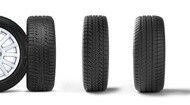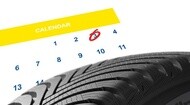
Auto Tips & Advice
All-season / Summer / Winter tires: what is the difference?
To make sure that you are always safe, your tires need to be adapted to your current weather conditions.
1. All-season:
The most popular tire on the road, built to handle “everyday” driving conditions. Its tread provides balanced dry and wet performance levels, as well as acceptable snow traction in regions with light winter weather. All-Season tires are a practical solution designed for year round usage with typically a long tread life.

2. Summer:
These tires are primarily designed for high-performance vehicles and provide optimized dry and wet performance levels in a temperate environment. Summer tires are designed for year round usage but should not be used during the winter season where temperatures are colder and approach freezing consistently as their performance would be less than optimal.
3. Winter tire:
These tires are specifically designed to offer optimal levels of traction on ice, snow, and slush in addition to wet and dry road surfaces in severe cold weather conditions. Severe cold weather conditions are defined to occur when ambient temperatures are consistently below freezing and/or there is substantial winter precipitation. Winter tires are not intended for year round usage. All winter tires exhibit the Mountain Snow Flake marking indicating suitability for winter application.
4. All-Terrain:
These are off-road tires designed to give you excellent grip in mud, dirt and rocks. They can be driven on the road, but offer a louder ride noise than most other tires, along with less treadwear due to their unique tread design.
Do I need winter tires ?
Yes, if you live in an area where the ambient temperature regularly approaches freezing point below 44°F or gets heavy snow or ice then you will likely need winter tires. At that temperature, the rubber on standard tires starts to harden and can lose its grip.
Winter tires vs. Summer tires in winter weather
Winter tires are designed to perform better at lower temperatures and in a wide range of conditions such as wet roads, snow and ice. The difference in braking between winter tires and summer tires can be startling: a typical car travelling at just 31 mph on snow will take 52 yards to come to a full stop with summer tires – a scary 26 yards more than if the same car is equipped with winter tires.
When is it time to change my seasonal tires?
When the temperature regularly approaches freezing, replace your standard tires for winter tires. Put your all-season or summer tires back on when the temperature regularly warms back up.


Find a Dealer
Search by
Address, City or ZIP code


